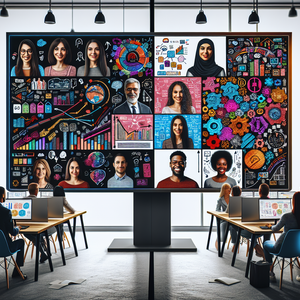The Future of Work: AI-Powered Career Coaching vs. Traditional Mentorship

AI-powered career coaching harnesses sophisticated algorithms and data analytics to offer personalized career advice that is both immediate and adaptive. These platforms evaluate a user's professional background, skills, and aspirations, delivering targeted recommendations that can significantly enhance career trajectories. For instance, tools like LinkedIn Learning and CareerBuilder employ AI to recommend courses and job opportunities tailored to individual profiles and market trends.
Supporting Example
Imagine a recent graduate entering the job market. By inputting their degree, internships, and skillset into an AI-powered platform, they might discover job roles in emerging fields such as data analytics or digital marketing—positions they may not have considered before. Additionally, the AI can suggest skill development courses that align with these roles, providing a clear roadmap for career progression.
The Value of Traditional Mentorship
In contrast, traditional mentorship offers a more nuanced, personal approach to career guidance. Mentors, often seasoned professionals, provide emotional support, industry insights, and networking opportunities that AI tools may lack. The mentor-mentee relationship fosters trust and open communication, enabling mentees to gain invaluable advice based on real-world experiences.
Supporting Example
Consider a young marketing professional seeking to climb the corporate ladder. A mentor in the industry can share personal anecdotes about navigating office politics, understanding company culture, and developing soft skills crucial for success. These insights are often rich in context, helping the mentee to grasp how to apply their technical knowledge in practical situations—something an AI algorithm may not provide.
Comparing Effectiveness and Accessibility
The effectiveness of AI-powered coaching compared to traditional mentorship can be context-dependent. AI tools excel in providing quick, data-driven insights accessible 24/7, making them appealing for those with demanding schedules or limited access to professional networks. However, traditional mentorship may lead to deeper, more meaningful connections that enhance learning and growth.
Supporting Example
For an individual living in a remote area, an AI platform might be their only source of career guidance, offering instant access to job market insights and skill assessments. Conversely, a city dweller with a robust professional network may find greater value in face-to-face mentorship, where they can engage in rich discussions and build lasting relationships.
The Coexistence of AI and Mentorship
Rather than viewing AI-powered career coaching and traditional mentorship as adversaries, it is vital to recognize their potential for coexistence. AI can enhance the mentorship experience by providing data-driven insights that mentors can leverage to support their mentees more effectively. This synergy facilitates a more focused and productive mentorship dynamic.
Supporting Example
A mentor could utilize AI analytics to pinpoint specific skills their mentee needs to develop, allowing for targeted discussions and goal-setting. Such a framework ensures that the mentorship relationship remains dynamic and responsive to the mentee's evolving career needs.
As we forge ahead into the future of work, the conversation surrounding AI-powered career coaching and traditional mentorship will undoubtedly persist. Each approach offers distinct advantages and limitations, but they need not exist in opposition. By embracing both AI tools and traditional mentorship, individuals can access a comprehensive career development framework that combines data-driven insights with personal experiences. This fusion of technology and human connection will redefine how professionals support one another on their career journeys, ultimately paving the way for more fulfilling and successful careers in an increasingly complex job market. As we continue to adapt to rapid technological changes, the collaboration between AI and mentorship will be key in shaping a future where every individual can thrive.
AI Career Coach
Tech startups, educational platforms like Coursera or LinkedIn Learning, and HR tech companies
Core Responsibilities
Develop and implement AI algorithms to analyze career trajectories and recommend personalized career paths.
Collaborate with data scientists to enhance the accuracy of predictive analytics regarding job market trends.
Create user-friendly interfaces that allow clients to interact with AI tools seamlessly.
Required Skills
Proficiency in programming languages such as Python or R, with experience in machine learning and natural language processing.
Strong understanding of career development principles and job market dynamics.
Experience in UX/UI design to ensure intuitive user experience.
Data Analytics Mentor
Consulting firms, corporate training organizations, and universities
Core Responsibilities
Provide one-on-one mentoring to emerging data analysts on project work, portfolio development, and industry standards.
Share insights on navigating the complexities of data interpretation and visualization techniques.
Guide mentees on soft skills such as teamwork, communication, and presenting findings effectively.
Required Skills
Extensive experience in data analytics tools (e.g., SQL, Tableau, or Python) and an understanding of statistical modeling.
Strong interpersonal skills to foster a trusting mentor-mentee relationship.
Proven track record of successful project outcomes in data analysis.
Digital Marketing Specialist
Marketing agencies, e-commerce companies, and in-house marketing departments
Core Responsibilities
Develop and execute targeted digital marketing campaigns across various platforms (social media, email, SEO).
Analyze campaign performance data to optimize strategies and increase ROI.
Mentor junior marketing staff and interns on best practices in digital strategy and analytics.
Required Skills
Proficiency in digital marketing tools (e.g., Google Analytics, HubSpot, or Hootsuite) and data interpretation.
Strong creative thinking skills combined with analytical capabilities.
Excellent communication skills for both campaign execution and mentorship roles.
Career Development Coordinator
Educational institutions, corporate HR departments, and nonprofit organizations focused on career development
Core Responsibilities
Design and implement career development programs that integrate both AI tools and traditional mentorship.
Conduct workshops and training sessions to help participants enhance their career skills and networking capabilities.
Evaluate the effectiveness of career development initiatives and make data-driven recommendations for improvements.
Required Skills
Experience in program development and project management, particularly in educational or corporate settings.
Strong organizational and communication skills to facilitate workshops and mentorship pairings.
Familiarity with data analysis tools to assess program impact.
Human Resources Technology Specialist
Large corporations, HR technology firms, and consulting agencies focused on workforce optimization
Core Responsibilities
Oversee the integration and implementation of AI-driven HR tools, including career coaching platforms and performance management systems.
Provide training and support to HR teams on utilizing AI tools for talent management and employee development.
Analyze HR data to identify trends and areas for improvement in employee engagement and career progression.
Required Skills
Knowledge of HR principles combined with technical expertise in HRIS and AI technologies.
Strong analytical skills to interpret data and make strategic recommendations.
Excellent communication skills to liaise with both technical teams and HR professionals.


